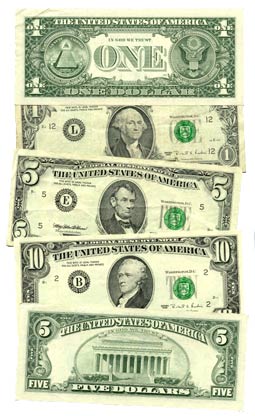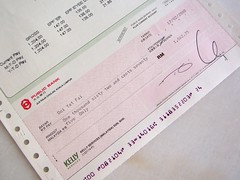- Uop past midnight. 3am feeding. 5am hurts. Back to bed? #
- Stayed up this morning and watched Terminator:Salvation. AWAKs make for bad plot advancement. #
- Last night, Inglorious Basterds was not what I was expecting. #
- @jeffrosecfp It's a fun time, huh. These few months are payment for the fun months coming, when babies become interactive. 🙂 in reply to jeffrosecfp #
- RT @BSimple: RT @bugeyedguide: When we cling to past experiences we keep giving them energy…and we do not have much energy to spare #
- RT @LivingFrugal: Jan 18, Pizza Soup (GOOOOOD Stuff) http://bit.ly/5rOTuc #budget #money #
- Free Turbotax for low income or active-duty military. http://su.pr/29y30d #
- To most ppl,you're just somebody [from casting] to play the bit part of "Other Office Worker" in the movie of their life http://su.pr/1DYMQZ #
- RT @MoneyCrashers: Money Crashers 2010 New Year Giveaway Bash – $8,300 in Cash and Amazing Prizes http://bt.io/DQHw #
- RT: @flexo: RT @wisebread: Tylenol, Motrin, Rolaids, and Benadryl RECALLED! Check your cabinets: http://bit.ly/4BVJfJ #
- New goal for Feb. 100 pushups in 1 set. Anyone care to join me? #
- RT @BSimple: Your future is created by what you do today, not tomorrow"— Robert Kiyosaki So take action now. #
- RT @hughdeburgh: "Everything you live through helps to make you the person you are now." ~ Sophia Loren #
- Chances of finding winter boots at a thrift store in January? Why do they wear our at the worst time? #
- @LenPenzo Anyone who make something completely idiot proof underestimates the ingenuity of complete idiots. in reply to LenPenzo #
- RT @zappos: "Lots of people want to ride w/ you in the limo, but what you want is someone who will take the bus w/ you…" -Oprah Winfrey #
- RT @chrisguillebeau: "The cobra will bite you whether you call it cobra or Mr. Cobra" -Indian Proverb (via @boxofcrayons) #
- RT @SuburbanDollar: I keep track of all my blogging income and expenses using http://outright.com it is free&helps with taxes #savvyblogging #
- Reading: Your Most Frequently Asked Running Questions – Answered http://bit.ly/8panmw via @zen_habits #
6 Questions to Financially Get to Know Each Other
This topic has been blatantly stolen from Budgets are Sexy.
1) How do you spend: cash, debit or credit? I use cash almost exclusively. I live in Minnesota and have two small children, so bundling the brats up to go inside the gas station to pay is nuts. Gas stations get the debit card. Online shopping, or automatic payments set up in the payee’s system are done on a credit card that gets paid off every month.
[ad name=”inlineright”]2) Do you bank online? How about use a financial aggregator (Mint, Wesabe, Yodlee, etc.)? I bank online. I use USBank for my daily cash flow, INGDirect for savings management and Wells Fargo for business. I used Mint strictly as a net worth calculator and alerting system. I use Quicken to manage my money and a spreadsheet for my budget, but I really like the quick, hands-off way that Mint gathers my account information and emails low balance alerts.
3) What recurring bills do you have set on autopay? Absolutely everything except daycare, 2 annual payments, and 1 quarterly payment.
4) How are your finances automated? I use USBank’s billpay system, instead of setting up autopayments at every possible payee. This gives me instant total control and reminders before each payment. The exceptions are my mortgage, netflix, and Dish. My mortgage company takes the money automatically from my checking. The other two hit a credit card automatically. Our paychecks are direct-deposited and automatically transferred to the different accounts and banks, as necessary.
5) Do you write checks? If so, how often? Once per week, for daycare. Occasionally for school fundraisers.
6) Where do you stash your short-term savings? I have quite a few savings accounts with INGDirect to meet all of my savings goals. For the truly short term, I add a line item in Quicken and just leave the money in my checking account.
Who’s next?
How Banks Work
On the first and the fifteenth of every month, my paycheck is deposited into my bank account. Some fraction of it is saved, while another(larger) fraction is spent. They put the money in a vault and protect it from being stolen. Anything I manage to save and anything I haven’t managed to spend yet, will build interest. The bank pays me to keep my money there, even if it’s just for a short time. Why would they do that? If I asked you to hold on to $100 for me, in exchange for giving me $10 next week, you’d laugh at me. Right? If I told you that I was expecting you to keep that $100 heavily guarded in a locked room that requires a staff and utilities, you’d try to have me committed, yet that’s what banks do every day.
What’s in it for the bank?
Let’s start at the beginning. In the financial world, there are fundamentally two types of people: those who have money and those who need it.
The people who have money get it by producing something or otherwise providing value to someone for something. They then spend less than they made, leading to an accumulation of money. Woo! Rich people! Naturally, this money gets stuffed in a mattress for safe-keeping. Their money does nothing except collect dust and, occasionally, hungry insects. It is also used to soften a hard mattress.
People who need money have a few choices. They can beg for it, work for it, or steal it. The third option leads to perforation or imprisonment, so we won’t address that one. Now, you can work for your paycheck, like most adults, or you can go, hat in hand, to a charity and ask for money. But what if you want to start a business? You’ve invented the super-widget, a device guaranteed to revolutionize the world more than anything since sliced bread or the USB-powered pet rock. You got a concept and a prototype, you just don’t have the tooling or manpower to produce the millions of super-widgets the world will soon be beating a path to your door to own. You also lack a marketing budget to tell the world to stock up on path-beaters to make it to your door. What do you do?
Enter banks.
A bank will approach the first class of people and talk their money out of the mattresses and mayonnaise jars. They offer to hold the money for the people who have it. They will protect it from theft and they will pay the owner a fee for the privilege of holding on to the cash safely. Of course savers jump at the chance. They can quit worrying about the maid making the bed and becoming a millionaire and they can build wealth with no work. But wait…TANSTAAFL, right? You can’t get something for nothing. The world doesn’t work that way.
The bank takes your money–and the money of thousands of people like you–for safe-keeping. They pay you a fee, called interest. The rest, the loan out to the second group of people, the ones who need the money. They set aside some of the deposits so the owners can make withdrawals, but the rest goes into the loan-pool. People who need money come to the bank, explain their needs and demonstrate their ability to repay the loan, then they are given money for a fee, also called interest. The interest rate for the borrower is significantly higher–sometimes 20 times higher–than the interest paid to depositors. The difference between interest earned and interest paid is what pays the bank’s bills. That gap pays for the rent, taxes, and payroll.
Ultimately, a bank’s job is to connect the savers with the spenders in a way that’s reliable enough to ensure everybody benefits. If anybody in the chain ceases to benefit, the system collapses. Depositors switch back to using mattresses, borrowers go back to their loan-shark grandparents, and banks close their doors. This is the system that allows the entrepreneurial spirit to thrive, while making money for everyone involved.
3 Things Everyone Should Do Before the End of 2010

- Image via Wikipedia
New Year’s resolutions are great, but what are you doing the rest of the year? As we roll into summer and we see the year’s halfway point approaching, it’s important to look at our goals and our progress and see if we’re on track for where we want to be in our lives.
Financially, now is the time to start preparing for the new year. Don’t be like most people and wait until December to think about it.
Here’s a place to start:
- Max out your 401(k). If you are under 50 years old, your maximum annual contribution is $16,500. If you haven’t contributed to your 401(k), yet, this means you will have to deposit $2358 per month to max it out. If you would have started at the beginning of the year it would only be $1375 per month. If those numbers are out of reach, at least contribute enough to get your employer’s match. If your company matches 50% of your contribution up to 5%, you need to be contributing 5%. If your gross paycheck is $1000, you should contribute $50. If you do so, your company will be giving you $25. That’s free money and a 2.5% raise! With a pre-tax contribution, you are also lowering your taxable wage, so the 5% contribution is not lowering your take-home pay by 5%. In some cases, it may even raise your take-home pay!
- Know your money. Take some time to examine your income and your expenses. What are you having withheld? Will that leave you with a large tax bill next spring? Will it give you a huge tax refund, which is just an interest-free loan to the government? You withholding goal should be to pay nothing and receive nothing when you file your taxes in the spring. The less you withhold, the more you have for your daily expenses, but, if you withhold too much, you risk an unaffordable tax bill and possible penalties later. Look also at your expenses. Have you used your gym membership in the last few months? Cancel it. Do you know every cent you have to pay each month? Figure it out so you can plan the rest of your financial year. A budget is helpful here.
- Own your debt. “It’s not my fault.” “My ex stole my bank account.” “My dog ate the bill.” “My kidneys were stolen and I woke up in a bathtub full of ice and an invoice for services rendered.” “I lost my job.” “I have an X-Box addiction.” “I gave my credit card to a stripper, but we broke up. Go after the stripper.” Excuses. Here’s the thing: None of it matters. You owe the debt. Your choices are to pay the debt or file bankruptcy. Either way, you need to own the debt and take responsibility for whatever choices you made or debt you’ve accumulated. Denial is not a successful coping mechanism. Whatever you choose to do, know that it is your choice. You can’t hide from your bills or your $15/day “Venti Soy Hazelnut Vanilla Cinnamon White Mocha with extra White Mocha and caramel” habit.
[ad name=”inlineleft”]
What are your financial plans for the rest of the year?
Update: This post has been included in the Festival of Frugality.
5 Reasons to Quit Saving and Start Living

- Image by owaief89 via Flickr
Life is all about trade-offs. You trade your time for a paycheck. Your trade your paycheck for food, rent, and security. Don’t get so obsessed with saving and security that you forget to live your life. There are many good reasons to put your savings on hold in order to really live. Here are five of them:
1. You have an adequate emergency fund. You will never hear me advise against an emergency fund. If you don’t have one, stop reading this and get one. Go. Without an emergency fund, your budget is a financial crisis waiting to happen. With an emergency fund, you can weather life’s speed-bumps without watching them become total train-wrecks.
2. Your retirement is on autopilot. You are not allowed to stop saving and investing for retirement. Ever. Assuming you have a traditionally scheduled career that involves you working until you hit 65 and deferring a huge chunk of living until then, your income will cease when you retire. Do you know how long you will live? Do you want to spend your retirement broke and bored? Are you relying on the responsible financial management of the federal government to make sure you will still get your Social Security? Invest in your retirement and get this investment on autopilot so you can stop worrying about it.
3. Your income is set. I don’t believe in the fairy tale of a company being loyal to its employees. The aren’t. However, if you have a stable-ish job, an in-demand career, and some side-income coming from alternate sources, your emergency fund can be enough to carry you through the low times. That’s what it’s there for.
4. You have dreams. If you’ve always wanted to travel the world, follow a band on your, volunteer extensively, or anything else, it’s time to do it. Don’t postpone your passion.
5. Deathbed regrets suck. Very few people lie on their deathbed lamenting the things they did. Regrets tend to be focused on opportunities missed, skipped, or indefinitely postponed. Do the things that are important to you before it’s too late to do them. Don’t abandon your future in favor of current pleasures, but don’t forget to live, now.
Do you have any other reasons to stop saving?
Cheap Vacations
- Image via Wikipedia
Last month, we went on vacation for a week. It was our first debt-free vacation, ever! We had a busy week, full of fun activities and it didn’t break the bank. We saved money on everything we could.
Hotel
We save a lot of money by staying at a casino/hotel that was a 20 minute trip away from our vacation city. This won’t save money if you have a problem with gambling. The only time we went to the casino was to get to the connected restaurant.
We made the hotel even cheaper by arriving on a Sunday and leaving on a Friday, avoiding the weekend rates. That gave us a full 6 day vacation with no rush to pack and 2 days to recover and relax when we were done. We just didn’t see the point of checking out on Saturday, just to head home, when we could check out on Friday, spend the day seeing the sights, then leave late.
Meals
I like good food, but feeding a family of five for a week costs far too much. So we compromised.
We brought milk and cereal to the hotel. Instead of rushing to get out of the hotel for breakfast, we had a leisurely breakfast in our jammies and took our time getting moving. No stress. For our daytrips, we packed sandwiches, juice, and snacks; avoiding the need for lunchtime restaurants. Dinner was our extravagance. Every night, we ate someplace nice. Not fancy, but nice. Our food budget was about $30 for the week, not counting dinner.
Attractions
I had a plan to keep every day fun, without resorting to using an agenda. We were far to flexible to call it an agenda. They just don’t make vacations fun for me. We had one thing planned each morning, one each afternoon, and one each evening. Every day, one of those things was spending a couple of hours in the hotel pool. No stress.
The first thing I did was hit the city’s tourism website for coupons. Yay us!
We tried to group our activities geographically to save on parking. For example, one day we went on a sight-seeing boat tour, then walked over the a retired-ore-freighter-turned-museum and only paid one parking fee, which was actually reimbursed by the tour company.
We also hit a lot of state parks, which was mostly free, except for the daily parking permits.
Some of the museums had gotten together to offer a “3 attractions for the price of 2” deal. This was available to us, but I didn’t find out about it until the end of the week. Luckily, it only cost us a few dollars more to use the other coupons.
When we had some spare time, we did other things, like bowling or catching a matinee. They were just some cheap time-fillers, but still good times.
All in all, we had a great time. Nobody was bored and we didn’t end up broke. A good time was had by all, and I got to teach my son how to play poker.
How do you save money on vacation?

